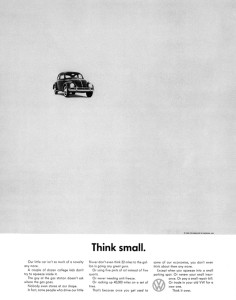Think Small Yourself, Julian Koenig

In his waning years, advertising legend Julian Koenig, whose claims to fame included what has been ranked by Ad Age as the greatest ad of the last century, the 1959 “Think Small” campaign for Volkswagen, gave an interview in which he discounted his enviable career in advertising by saying he was ashamed of having devoted his god-given talent to spreading lies. He concluded that all advertising is a lie. Then he died.
Okay. Maybe the disillusioned rantings of a cranky nonagenarian. But I say, speak for yourself, Julian.
At this stage of my own career, which has been now as long as Koenig’s was when he was active, I can categorically state that I have never lied in an ad I’ve written, art directed, creative directed or had any part of. I may not be the legend that he was. But I’ve been pretty proud of my campaigns, some of which have won international awards, some of which have hung in the Smithsonian, some of which have even been phenomenally successful in terms of increasing sales, many of which have been just as funny. But all of them the truth.
Koenig, too, spent way too much of his later life in a personal feud over who really came up with the Volkswagen campaign, he and art-director Helmut Krone, or notorious self-aggrandizer, George Lois. These names would only mean something to deep advertising geeks. Old advertising geeks. But Koenig wouldn’t let it drop. His own daughter, This American Life producer Sarah Koenig, did a show on how obsessed her father became with his vendetta about credit, long after the world acknowledged that he was right and George Lois was a poseur. But who cares?
Get over it.
I myself (in fact, probably most people who’ve made a living as a creative professional) have known people claiming credit for my work. It happens. The world is full of pilot fish pretending to be sharks. But it’s just advertising. It isn’t like James Watson getting the Nobel Prize for “discovering” the double-helix structure of DNA when he caught a lecture on the subject by the real discoverer, Rosalind Franklin. (Don’t get me started.)
But getting back to the claim that all advertising is a lie. That’s a lie itself. It has long been a meme circulated by smug cynics. And when one of the greatest practitioners of the craft, like Koenig, sputters it in an interview at the end of his life, those cynics loved to jump on it and say, “See? We told you!”
But saying that is like saying that all music is the same crap. Or all surgery is butchery. Or all plumbers are crooks. Or all politicians are corrupt. Or that everything the government does turns bad. It’s too easy. And it’s especially easy for people who aren’t copywriters or composers or surgeons or plumbers or politicians or government employees. I want to ask those critics, “What is it you do for a living? You know, to rip people off?”
I myself felt that Koenig was full of crap in “admitting” that advertising is based on a lie. He may have felt guilty himself about knowingly writing a lie at some incident in his career. But that’s his problem. It’s not something I’ve ever been tempted to do. Telling lies is not only not required of good advertising, it’s actively policed by the industry. Good advertising–great advertising–not only tells the truth, it tells it elegantly, a truth that touches at the core of people’s lives. People are really good at smelling bullshit. But they’re also really good at knowing what’s true.
Most people anyway. The ones I party with.
